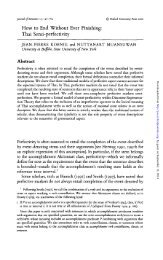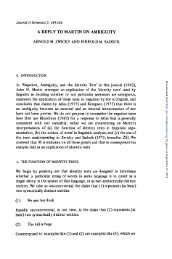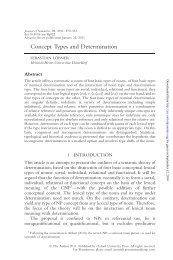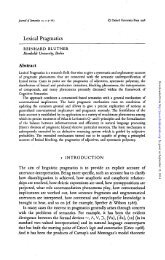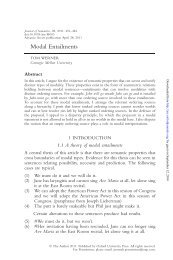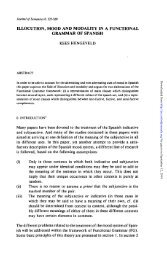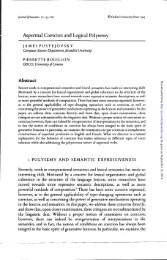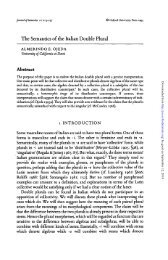Exclusive Company: Only and the Dynamics of Vertical Inference ...
Exclusive Company: Only and the Dynamics of Vertical Inference ...
Exclusive Company: Only and the Dynamics of Vertical Inference ...
You also want an ePaper? Increase the reach of your titles
YUMPU automatically turns print PDFs into web optimized ePapers that Google loves.
16 <strong>Only</strong> <strong>and</strong> <strong>the</strong> <strong>Dynamics</strong> <strong>of</strong> <strong>Vertical</strong> <strong>Inference</strong><br />
make a tree <strong>and</strong> <strong>the</strong> set <strong>of</strong> tree-makers is non-null, <strong>the</strong>n <strong>the</strong> truth <strong>of</strong> <strong>the</strong><br />
prejacent follows. No specific rule—entailment, presupposition, implicature—<br />
need be stipulated for deriving (35 b) from (35 a).<br />
(35) a. <strong>Only</strong> God can make a tree.<br />
b. God can make a tree.<br />
c. No one o<strong>the</strong>r can God can make a tree.<br />
d. {x I x can make a tree} / 0<br />
On this view, we correctly predict that when 1 ask who's coming <strong>and</strong> you<br />
answer 'only John', all I must presuppose—all my model <strong>of</strong> <strong>the</strong> context must<br />
accommodate—is that someone is coming, not thatjohn is: (36c) but not (36d) is<br />
jiven'. 22<br />
(36) a. —Who's coming tonight<br />
b. —<strong>Only</strong> John (is coming).<br />
c. Someone is coming.<br />
d. John is coming.<br />
A neo-Burleyan approach also fares better than its market competitors in<br />
capturing <strong>the</strong> appropriate intuitions for <strong>the</strong> following context. In September<br />
1994,1 place a wager with you, staking $100 on <strong>the</strong> proposition that only Seattle<br />
will win more than 60 games in <strong>the</strong> upcoming regular season for <strong>the</strong> National<br />
Basketball Association. Now consider <strong>the</strong> following four possible scenarios on<br />
how season <strong>and</strong> bet play our, <strong>the</strong> last column reflects my sense <strong>of</strong> <strong>the</strong> proper<br />
resolution <strong>of</strong> <strong>the</strong> wager.<br />
(37) SCENARIOS Theories Theory P Theories Intuition<br />
C/C A<br />
PP/M/G<br />
Seattle wins 62 games;<br />
every o<strong>the</strong>r team wins < 60 W W W W<br />
Seattle wins 62 games,<br />
Orl<strong>and</strong>o wins 61 L L L L<br />
No team wins more than<br />
60 games<br />
San Antonio wins 62, every<br />
o<strong>the</strong>r team wins < 60<br />
[=ACTUAL RESULTS]<br />
Downloaded from http://jos.oxfordjournals.org/ by guest on September 12, 2014<br />
The first two scenarios are straightforward: when <strong>the</strong> prejacent holds, all<br />
<strong>the</strong>ories correctly predict that I win <strong>the</strong> bet if <strong>the</strong> exclusion holds <strong>and</strong> lose if it<br />
fails. But only <strong>the</strong> neo-Burleyan <strong>the</strong>ory allows us to distinguish <strong>the</strong> existential<br />
failure in <strong>the</strong> third case, where no accommodation is possible, from <strong>the</strong> mere<br />
falsity <strong>of</strong> <strong>the</strong> prejacent in <strong>the</strong> fourth, where accommodation <strong>of</strong> <strong>the</strong> existential<br />
proceeds unimpeded. 23



